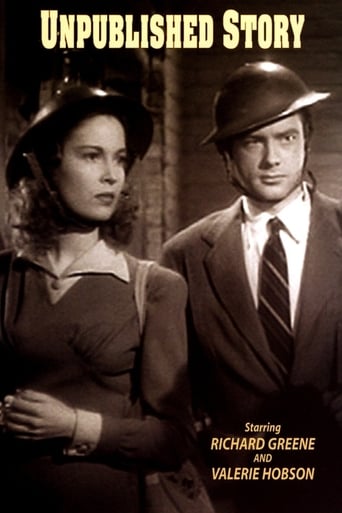JohnHowardReid
A Two Cities Film, made at D & P Studios, Denham, presented by J. Arthur Rank, released through Columbia Pictures Corp. Not copyrighted in the U.S.A. No New York opening. U.S. release: 11 April 1942. U.K. release: 10 August 1942. Australian release: 23 September 1943 (sic). 8,444 feet. 93½ minutes.SYNOPSIS: British newspaperman tangles with Nazi spies in London during the blitz.COMMENT: Despite some very conventional characters and plot strands in this wartime newspaper yarn, this is a truly remarkable film. Aside from the actuality footage of the London blitz which is skilfully worked into the fabric of the movie itself - horrifying, unbelievable material of human ingenuity, courage, perseverance and insistence on "normalcy" in the face of incredibly wanton destruction, peril and danger - there are a number of astonishing set-pieces including an extended dolly shot of vast crowds of evacuated Dunkirk servicemen at a railway station and a skilfully disorienting tracking shot down a London street in a black-out. The lighting, compositions and camera movement often reveal an imaginative skill far beyond the normal rather humdrum standards of director Harold French. At times indeed the terrifyingly real-life bizarreness of the movie's background overshadows the story - particularly Valerie Hobson's part in it which has been struck from the cliched mould of novice girl reporter makes good (though she does figure in an edge-of-the-seat cliffhanger bit of action which would put any Hollywood serial to shame). Greene is also solidly conventional though he does have opportunities to show his mettle. The other players are likewise predictably cast and serve their roles with the fine exactitudes we might expect, though we should note Ronald Shiner in a small but straight role, and the wonderfully realistic portrait of Frederick Cooper as the belittled Trapes. Production values are amazingly lavish. Although there's plenty of vividly staged action, it is even more for its contemporary insight into London living in the truly horrifying nights of 1941-42, that merits Unpublished Story a top place in British cinema.
MartinHafer
"Unpublished Story" is a very unique look into Britain during the war years. In many ways, it comes off a bit like a documentary--with events unfolding shortly after they happened for real. However, it is a drama--one based, in part, on real events and real Nazi-backed movements within Allied nations.The film begins with a reporter, Bob Randall (Richard Greene) straggling in from the Dunkirk boat lift. He's dead tired but anxious to report what he saw--in particular, fifth columnists (i.e., Nazi agents posing as regular French citizens) who helped the Germans to topple France. However, to his surprise, he finds that folks in Britain STILL don't want to come to terms with this--and so-called 'peace' or 'appeasement' groups within the UK STILL are pushing for a peaceful settlement to the Nazis--even though the war was raging. But Bob is relentless and with the help of a new lady reporter (Valerie Hobson), they doggedly follow these groups and dig deeper. Not surprisingly, they find very bad people behind all of this.This is a very fascinating view of the war--through the eyes of the Brits and discussing a lot of things you rarely see through normal documentary films--the fear, the Home Guard, hysteria and the Blitz. To help matters, the acting is amazingly good--very realistic and subdued. It also helped that the film avoided many of the clichés and overly jingoistic material that sometimes filled Hollywood's wartime dramas. My only real complaint, and it's a tiny one, is the lousy use of rear projection in the scene outside St. Paul's during the Blitz.
mark.waltz
That is the motive of British correspondents Valarie Hobson and Richard Greene in this newspaper war drama about the revelation that a supposed group of protesters for peace are actually a front for Nazi spies trying to stir up trouble in England. This takes place during the London blitz when nightly raids and bunkers for the protection of the people still out on the streets during an air raid was a regular occurrence. The blitz scenes are extremely realistic, especially one when Greene rescues Hobson from a phone booth while a nearby building is about to collapse. Basil Radford is excellent as a speaker of the peace convention who learns the truth about his leaders a bit too late. The cinema warned us about the enemy in our own camps many times on-screen, whether through newspaper dramas like this or the adventures of a gambler in "All Through the Night".
JHC3
British war correspondent Bob Randall (Greene) personally witnesses the Allied defeat in France in May of 1940. After a harrowing experience, he is fortunate to be evacuated to England. He immediately resumes his position as a reporterfor a major London newspaper.While reporting daily news events, he discovers a society of pacifists, thePeople for Peace. Bob is incensed by this group, believing their activities are defeatist and are only advancing the Nazi cause. Unknown to the public, this group has been infiltrated by German agents who manipulate the society to sow despair among the British people.As the Germans bomb British cities, Bob makes it his personal mission to report on the activities of this group. He finds opposition among reporters who want free speech and British censors who, for security reasons, don't want the story published. Bob is eventually joined by another reporter, Carol Bennett(Hobson), who helps expose the enemy in their midst.This well made wartime film includes elements of quiet and very effectivehumor. This offsets the grim nature of war against the civilian population of London. Recommended.


